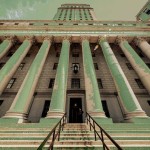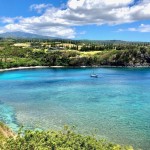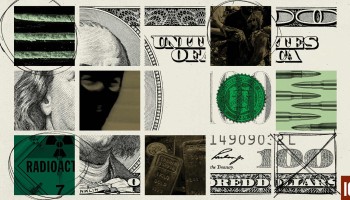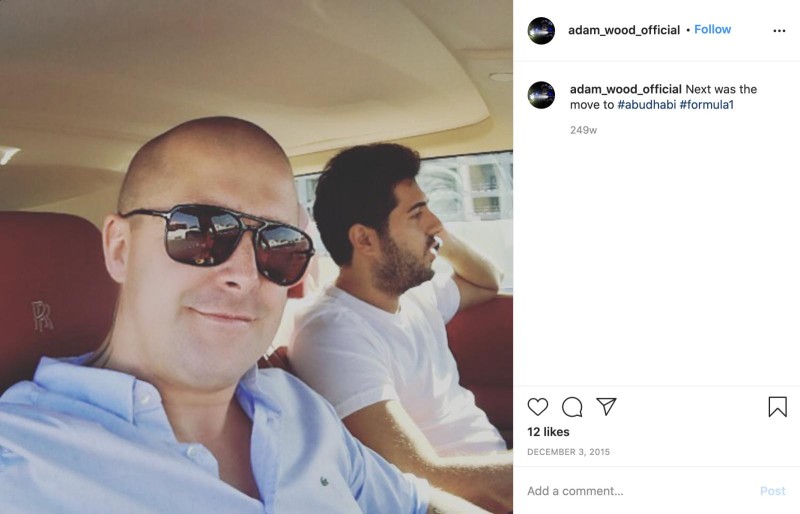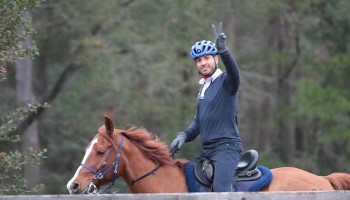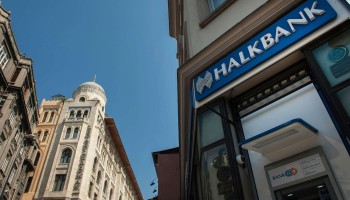On the day of his arrest in a massive money-laundering scheme that still sours relations between the United States and Turkey, Reza Zarrab was consumed by his true passion: the sea.
"I will book myself a hire car at the airport to take all scuba equipment and I'll find a hotel near yours," Adam Wood, his then-divemaster and asset manager said in a WhatsApp message sent March 19, 2016, as the two were about to depart for Florida.
“Write to this people [sic],” Zarrab told Wood, who’d pasted a link to a company that built a drone submarine Zarrab wanted for his growing fleet of ships and subs.
Hours later, Zarrab, then 33 years old, stepped off a plane and was handcuffed by FBI agents at Miami International Airport. His diving adventure would be diverted to a federal prison.
Zarrab later admitted in court to helping the Islamic Republic of Iran evade economic sanctions through a money-laundering scheme that U.S. federal prosecutors say threatened international security and set back nuclear non-proliferation in the Middle East.
About This Investigation
Using the U.S. Freedom of Information Act, OCCRP in 2019 obtained more than 750,000 bank transaction records, previously confidential communications, and other documents that were the basis of the U.S. investigation and 2016 prosecution of Reza Zarrab.
Before becoming the U.S. government’s star witness on the US$20 billion scheme, Zarrab was famous as the “Turkish Gatsby,” known for high living, access to top government officials, and his marriage to Ebru Gündeş, a famous Turkish singer and actress.
Zarrab exploited his father’s ties to the Iranian regime to greatly expand his family’s modest money-changing business into a wide-ranging criminal enterprise built on smuggled suitcases full of gold and cash; forged documents; industrial-scale bribery of Turkish politicians; and allegedly using the Turkish state bank Halkbank as a money laundry.
Perhaps the Turkish-Iranian businessman thought himself a patriot, helping his people in Iran bring home money trapped in foreign banks by harsh international sanctions.
Or perhaps the 8 percent commission was enough of a draw.
Big Money For His Passions
It’s likely the exact amount of Zarrab’s fortune — and how much he retains even after his U.S prosecution — will never be known.
Zarrab in 2016 declared during a pre-trial interview that he had an annual income of $720,000 from exporting gold, selling furniture, and other ventures.
That was an obvious lie.
On Turkish television in 2014, he bragged about exporting as much as a ton of gold per day.
Even at a conservative estimate of $300 per ounce, that volume would generate $3.5 billion per year, U.S. prosecutors later noted. His commission would have been $280 million per year.
He had expenses, of course. He said he reserved half for bribes and other expenses, bringing his annual take-home pay down to perhaps $140 million from gold alone.
The gold trade was one part of the sanctions-evasion scheme, which lasted at least five years and represented only a portion of Zarrab’s money-laundering business.
An itemized inventory discovered by U.S. prosecutors outlined Zarrab’s high-value assets in 2014: six expensive racehorses, 17 luxury cars, more than $10 million in artwork, 24 firearms used by his security detail, and 20 properties in his name with three more held through his business or family. The list also included seven sea-going vessels registered to Maltese and U.S. limited liability corporations.
As the list suggests, Zarrab liked his boats.
In July 2015, as six world powers reached an Iran nuclear limitation deal after years of painstaking negotiation, Zarrab was summering aboard the 60 Years, his 46-meter yacht based at the Turkish resort of Bodrum. He was also overseeing plans to build a superyacht nearly twice as big and able to accomodate three submersibles.
Wood, an English divemaster, was hired in 2014 to manage Zarrab’s seagoing assets and assemble what he described on a CV as the “largest collection of privately-owned rebreathers, dive equipment and associated diving accessories in the world.”
But he became much more than that, and his penchant for social media provides an unparalleled record of Zarrab’s globe-trotting lifestyle of superyachts, personal submarines, fast cars and partying with celebrities. He chronicled travel on Zarrab’s Bombardier Challenger 300 private jet, helicopter hops to Saint Tropez for lunch, and 700-euro bottles of limited edition Beluga vodka at dinner.
Turkish media in 2015 further documented Zarrab’s purchase of a second private jet, a Gulfstream G550 worth $58 million, through Are Havacilik, a Turkish company he owned.
It was an opulent life made possible by money from one of the world’s most repressive regimes.
Now living in the United Kingdom, Wood has never been accused of any wrongdoing in connection with Zarrab. He initially agreed to an interview with OCCRP but later backed out. “I don’t really have time for this,” Wood wrote in a WhatsApp message.
The Rich Man’s Jacques Cousteau
“My first passion was the sea,” Zarrab mused on a web page for his main company, Royal Holdings, archived roughly a year before his arrest. “I learned to smell the salty air, to fight the waves, to find a quiet harbor in the storms.”
The former captain of the 60 Years told OCCRP that Zarrab was on the yacht virtually every day in the summer of 2015, spearfishing and entertaining guests. Zarrab was proud of this toy and bragged on the Royal Holdings website that it was a Boat International “World Superyacht Awards 2013” finalist. It didn’t win.
In a photo posted in the summer of 2015, Wood showed Zarrab relaxing on deck with several associates, including Turkish actor Metin Cantimur. A 21-meter Azimut luxury yacht is seen in the background.
The captain, who asked to remain anonymous because of contractual confidentiality, said Zarrab used the Azimut as a dive support boat, but he had bigger ambitions.
Just weeks before his arrest in Miami, Zarrab bought Ocean Explorer, a former Royal Swedish Navy minesweeper to use as a diving support vessel. Text messages show that Zarrab closely monitored Wood as he delivered the vessel to Turkey.
“Adem when is new boat coming?” Zarrab demanded in a message sent on February 19, 2016. The two discussed the vessel’s new paint, logo, and other minor details requiring his boss’s approval. He also posted videos of the choppy passage across a freezing North Sea.
“His dream was to follow the path of Jacques Cousteau,” the former captain said, referring to the famed French undersea explorer. “He was constantly watching videos about Jacques Cousteau’s research.”
Zarrab even tried to name his new diving support vessel after Jacques Cousteau’s famed Calypso, text messages show. Wood suggested alternatives.
“Hi boss, Calypso Isn’t available in the Malta registry but ‘Calypso X’ is what do you think?” Unlike Cousteau, who lived aboard his own rustic surplus minesweeper, Zarrab planned to sail in comfort aboard 6 Decades, a new 85-million-euro ($95-million) superyacht.
The former yacht captain told OCCRP that Zarrab had hired Italian naval architects and a shipyard near Istanbul for the new superyacht’s construction, but the project was cancelled when Zarrab was arrested in the U.S.
In January 2016 Wood became a director of RZA Yachting Limited, a maritime company Zarrab set up in Malta, a common jurisdiction for confidential registration of superyachts. He was to supervise construction of 6 Decades. In an Instagram photo from that time he’s shown at a desk with what appear to be blueprints for a vessel.
After Zarrab’s arrest in Miami, Wood was replaced at RZA Yachting Limited by Can Sarraf — a Turkish pseudonym for Zarrab’s brother, Mohammad Zarrab, who was also indicted in the U.S. for his role in the Iran sanctions busting. He remains at large, as do several other Zarrab associates who face arrest in the U.S.
Zarrab’s submersibles were also meticulously documented on social media. In September 2015, he and Wood test-drove submarines at the Monaco Yacht Show. Social media posts show Zarrab inside a sub, and the two on WhatsApp discussed buying a model from U-Boat Worx, a Netherlands submarine builder that offers VIP clients “unparalleled comfort,” for about 790,000 euros.
The former yacht captain said Zarrab bought at least one sub at the show. Some months later, Wood posted a photo from U-Boat Worx.
“Viewing our submarine in build process. Amazing!” Wood exclaimed.
The scuba instructor also posted about Zarrab’s rented two-seat Seabreacher semi-submersible shaped like a killer whale and marketed as “the twisted union of a marine mammal and a high performance fighter jet.”
‘Miami is a city in Florida’
Wood’s online resume, since taken offline, described his position as “Project Manager / Asset Manager” for Royal Holdings and working “directly for the owner.”
His tasks included supervising “two superyachts, six smaller watercraft and submarines; a Challenger 300 private jet; 13 motor vehicles; and three private residences,” apparently all at Bodrum, the Turkish resort town on the Aegean Sea.
Encrypted messages later obtained by U.S. prosecutors show Wood’s duties went far beyond salt water. He was even tasked with hiring a private governess for Zarrab's young daughter.
“We understand your need for that person to be energetic, be very happy and young at heart. Making learning fun but delivering discipline and being a lady at all times,” Wood wrote Zarrab on February 23, 2016.
The hard work was generously rewarded. Early in December 2015, Wood posted a series of photos with Zarrab driving around Abu Dhabi in a Rolls Royce, enjoying front-row seats at the Abu Dhabi Formula 1 Grand Prix in the afternoon and partying with the rapper Ludacris at VIP Room Dubai that night.
“Saturday night was Ludacris at #viproomdubai immense night” Wood gushed.
Unaware of indictments being filed under seal in New York, Wood continued to bask in the glow of his extravagant employer. Social media photos uploaded in March 2016 show him at the wheel of a Ferrari and a high-end Audi, flashing limited-edition Rolex and Oris dive watches.
On Instagram, Wood recounted his check-in at the Atlantis Hotel Dubai and fine dining at Nobu, the resort’s famed Japanese fusion restaurant. Nobu had also been the dining choice when he and Zarrab were shopping for submarines in Monaco.
Days later, the Zarrab family was off to Miami, with Wood in tow.
“Many bags!” Wood gushed in a comment accompanying a photo of luggage at Istanbul’s Ataturk International Airport on March 19, 2016. “Must mean it [sic] that time again!!! #DiveTeam #Miami #SouthBeach.”
Wood was unaware that hours later he would be detained with his boss.
The fact that Zarrab would visit the United States after his involvement in Iran sanctions evasion money laundering became public through a 2013 Turkish domestic bribery scandal has fueled speculation in media and law enforcement circles ever since.
One theory holds that Zarrab wanted to be arrested in the U.S. in hopes of avoiding the fate of Iranian billionaire Babak Zanjani, a business partner who weeks earlier had been condemned to death in Tehran for embezzlement, or “spreading corruption on earth,” according to the Islamic court that sentenced him.
But Zarrab’s private WhatsApp exchanges with Wood show no anxiety or mention of Iran.
Federal prosecutors later revealed that Zarrab was carrying $103,000 in cash and pushed an alternative theory: He and Gündeş were taking their daughter to Disney World in Orlando.
Disney was mentioned three times in encrypted chats, but it was a side trip, at best. They chatted dozens of times over several months about diving destinations, sharing links about shipwrecks and caverns to explore.
“Where is the diving site in usa,” Zarrab wrote on WhatsApp that March. Another note showed weak knowledge of U.S. geography when he asked the distance from Miami to Florida.
“Miami is a city in the state of Florida,” Wood explained.
Zarrab’s arrest and the abrupt end of the Florida adventure didn’t rate a social media mention by Wood, who told OCCRP he moved between Miami, New York and the U.K. in the subsequent months while still working for Zarrab. His social media profile shows he continued to oversee renovation of Ocean Explorer, Zarrab’s diving vessel in Bodrum. Two months after Zarrab’s arrest, he was posting from New York.
Zarrab was moved to New York pending trial on April 1, 2016. In 2018, Zarrab testified against Mehmet Hakan Atilla, a Halkbank executive who was convicted for aiding the Iran sanctions evasion. He’s also expected to be the star witness against Halkbank itself in a pending prosecution.
Though he pleaded guilty to various crimes related to fraud and money laundering, Zarrab traded his knowledge of the Iran scheme and culpability of Turkish officials for leniency.
U.S. officials won’t say where Zarrab is now, but he’s apparently not locked up. Several months after he appeared in court against Atilla, he was spotted out on the town in Manhattan, dining at Nobu with a woman identified in Turkish media as a friend of his wife.
He hasn’t been seen in public since.

